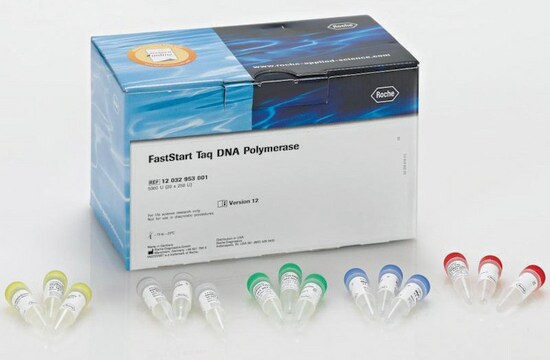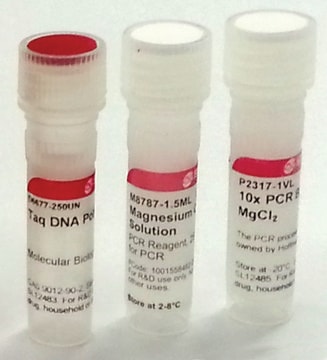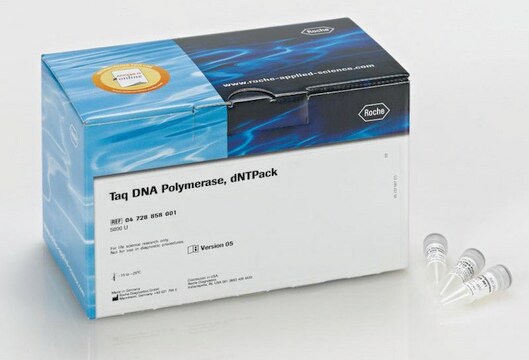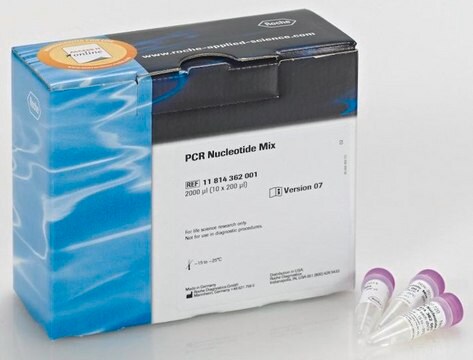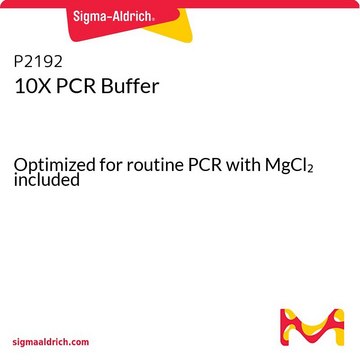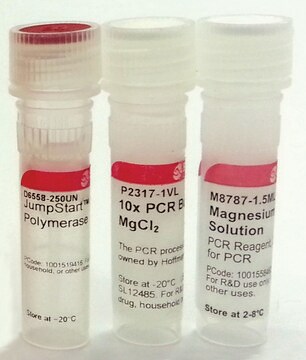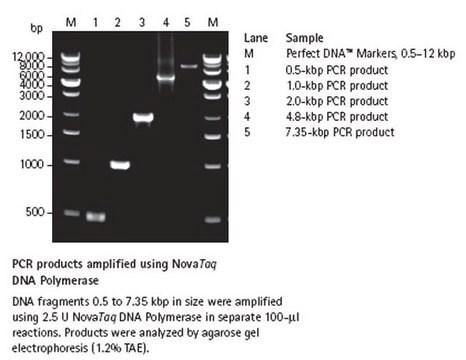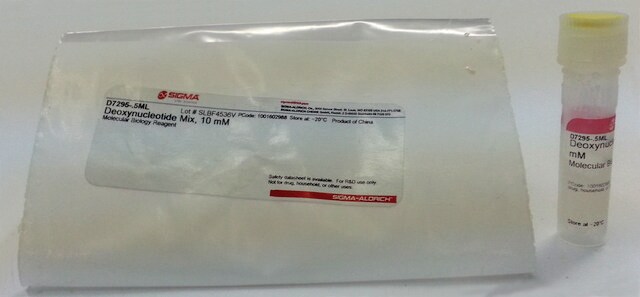Key Documents
TAQ-RO
Roche
Taq DNA Polymerase, 5 U/μl
optimum pH ~9.0 (20 °C), optimum reaction temp. 72 °C
Synonim(y):
dna amplification, pcr, polymerase, pcr, primer extension, dna amplification, primer extension
About This Item
Polecane produkty
pochodzenie biologiczne
bacterial (Thermus aquaticus)
Poziom jakości
rekombinowane
expressed in E. coli
klasa czystości
Molecular Biology
Postać
liquid
zastosowanie
sufficient for ≤1,000 reactions (11146173001)
sufficient for ≤10,000 reactions (11435094001)
sufficient for ≤2,000 reactions (11418432001)
sufficient for ≤5,000 reactions (11596594001)
sufficient for ≤200 reactions (11146165001)
aktywność właściwa
5 U/μL
masa cząsteczkowa
95 kDa
opakowanie
pkg of 1,000 U (11418432001 [4 x 250 U])
pkg of 2,500 U (11596594001 [10 x 250 U])
pkg of 5,000 U (11435094001 [20 x 250 U])
pkg of 100 U (11146165001)
pkg of 500 U (11146173001 [1 x 500 U])
producent / nazwa handlowa
Roche
Parametry
72 °C optimum reaction temp.
metody
DNA sequencing: suitable
PCR: suitable
kolor
colorless
optymalne pH
~9.0 (20 °C)
rozpuszczalność
water: miscible
przydatność
suitable for molecular biology
numer dostępu NCBI
numer dostępu UniProt
Zastosowanie
genomic analysis
life science and biopharma
obecność zanieczyszczeń
Nicking activity 30 units, none detected
Ribonuclease 30 units, none detected
Unspecific endonucleases 30 units, none detected
temp. przechowywania
−20°C
Powiązane kategorie
Opis ogólny
Taq DNA Polymerase was originally isolated from the thermophilic eubacterium Thermus aquaticus BM, a strain lacking Taq I restriction endonuclease. The enzyme was cloned in E.coli.
Zastosowanie
- PCR
- RT-PCR
- qPCR
- Other primer-extension reactions, such as sequencing and labeling
Cechy i korzyści
High lot-to-lot consistency.
No need to test each lot:
Taq DNA Polymerase is rigorously tested.
Prevent PCR carryover:
dUTP incorporation combination with Uracil-DNA Glycosylase prevents PCR cross-contamination.
Opakowanie
Jakość
Lack of restriction endonuclease:
The enzyme originally isolated from T. aquaticus BM lacks Taq I restriction endonuclease activity.Each lot is PCR tested using λDNA. Each lot is also tested for the absence of exo- and endonucleases, and nicking activities according to the current Quality Control procedures.
Definicja jednostki
Unit Assay: Incubation buffer:
67 mM Tris/HCl; pH 8.3/25 °C, 5 mM MgCl2, 10 mM Mercaptoethanol, 0.2% Polydocanol, 0.2 mg/ml Gelatine, 0.2 mM each dATP, dGTP, dTTP and 0.1 mM dCTP.
Incubation procedure:
M13mp9ss, M13 primer (17mer) and 1 μCi (α-32P) dCTP are incubated with suitable dilutions of Taq DNA Polymerase in 50 μl incubation buffer at +65 °C for 60 minutes. The amount of incorporated dNTPs is determined by trichloroacetic acid precipitation.
Volume Activity: 5 U/μl
Inne uwagi
Informacje prawne
Tylko elementy zestawu
- Taq DNA Polymerase 5 U/μl
- PCR Buffer with MgCl<sub>2</sub> 10x concentrated
- MgCl<sub>2</sub> Stock Solution
- PCR Buffer without MgCl<sub>2</sub>
Zwroty wskazujące rodzaj zagrożenia
Zwroty wskazujące środki ostrożności
Klasyfikacja zagrożeń
Aquatic Chronic 3
Kod klasy składowania
12 - Non Combustible Liquids
Klasa zagrożenia wodnego (WGK)
WGK 2
Temperatura zapłonu (°F)
does not flash
Temperatura zapłonu (°C)
does not flash
Certyfikaty analizy (CoA)
Poszukaj Certyfikaty analizy (CoA), wpisując numer partii/serii produktów. Numery serii i partii można znaleźć na etykiecie produktu po słowach „seria” lub „partia”.
Masz już ten produkt?
Dokumenty związane z niedawno zakupionymi produktami zostały zamieszczone w Bibliotece dokumentów.
Klienci oglądali również te produkty
Nasz zespół naukowców ma doświadczenie we wszystkich obszarach badań, w tym w naukach przyrodniczych, materiałoznawstwie, syntezie chemicznej, chromatografii, analityce i wielu innych dziedzinach.
Skontaktuj się z zespołem ds. pomocy technicznej